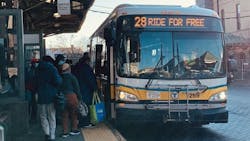Boston Mayor Wu extends free fares on three bus routes for two additional years
The city of Boston, Mass., will be extending its successful fare free bus program on routes 23, 28 and 29 until March 2026. The current fare free program on the three Massachusetts Bay Transportation Authority (MBTA) routes was set to end in late February 2024.
Boston Mayor Michelle Wu said the city will continue to use American Rescue Plan Act (ARPA) funding to reimburse the MBTA for an additional two years. The bus routes run along some of the highest ridership bus corridors in the city of Boston, with more than half of riders on Routes 23, 28 and 29 classified as low income. The fare free program has saved transit-critical riders money, increased ridership on these routes and maintained steady travel times despite an influx of riders.
“Fare free bus routes have been proven to make public transportation more convenient, accessible and affordable for our residents who depend on transit to get to work and school,” said Boston Mayor Wu. “Community members have emphasized that this program helps them save money and encourages more trips without worrying about exact change or rationing travel. Since this program started, we have seen similar initiatives take off around the commonwealth and the country. I’m thankful to our partners at the MBTA and the Healey administration for our ongoing collaborative work to improve transportation options throughout our city.”
“Fare free buses simplify the riding experience and make trips faster and more reliable,” said Jascha Franklin-Hodge, city of Boston's chief of streets. “They help riders spend less time and money commuting and allow them to spend more time with their families. We thank the MBTA for their partnership with this pilot and look forward to learning more about how fare free transit can positively impact our city streets.”
The city of Boston worked with Stantec to measure how free fares save more riders money and time while increasing ridership on these three bus routes. During the course of the program (since spring 2022), more than 12 million trips were taken on the free routes, creating an estimated savings of more than $6 million for riders. About 50 percent of riders are saving money, according to the city.
“We are thankful to Mayor Wu and the city of Boston for their continued support,” said Phillip Eng, MBTA general manager and CEO. “We have a common goal in making mass transit more affordable. Our combined efforts, from Boston’s fare-free bus program to Governor Healey’s proposed Low Income Fare Program, are benefiting communities who take all different modes of transit – buses, subways, commuter rail, ferries or paratransit. We are improving people’s quality of life and making a real difference, building a more equitable and affordable transportation system network for all who depend on it.”
According to data from the MBTA, Route 23 is at 94 percent of pre-pandemic ridership, Route 28 is at 102 percent and Route 29 is at 64 percent (as of October 2023). Average dwell times have decreased on Routes 23 and 28. The city of Boston will use $350,000 per month in ARPA funding for the extension of the program.
Fare free programs have been gaining momentum around Massachusetts and nationally since the city of Boston launched three free routes in March of 2022. Merrimack Valley Transit, which serves about 2.8 million riders a year, adopted free fares on all its bus and paratransit routes in March of 2022.
